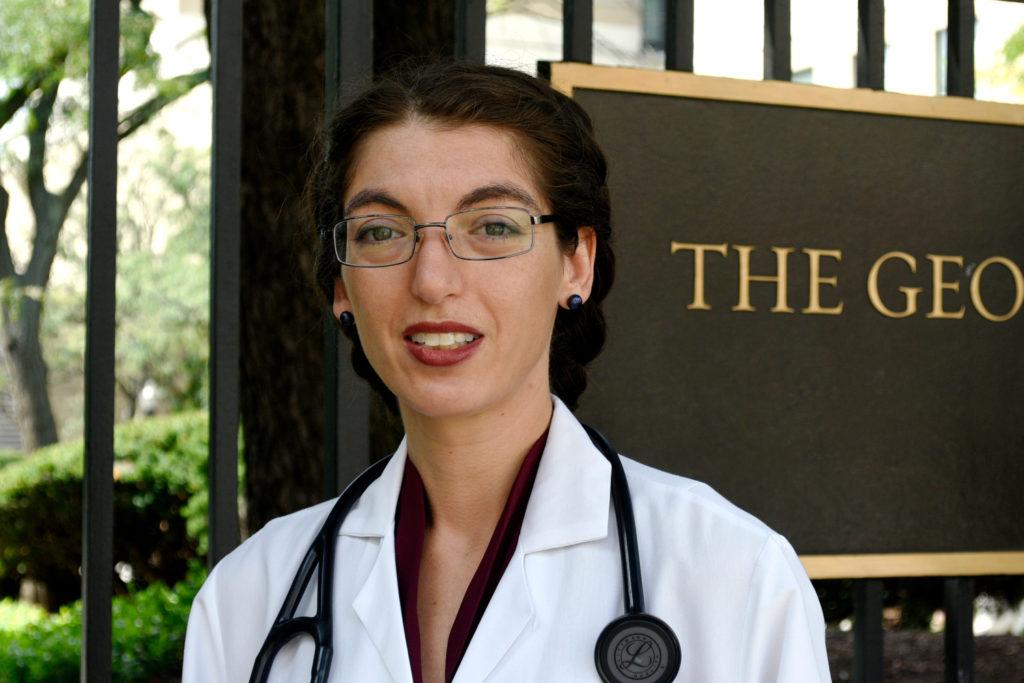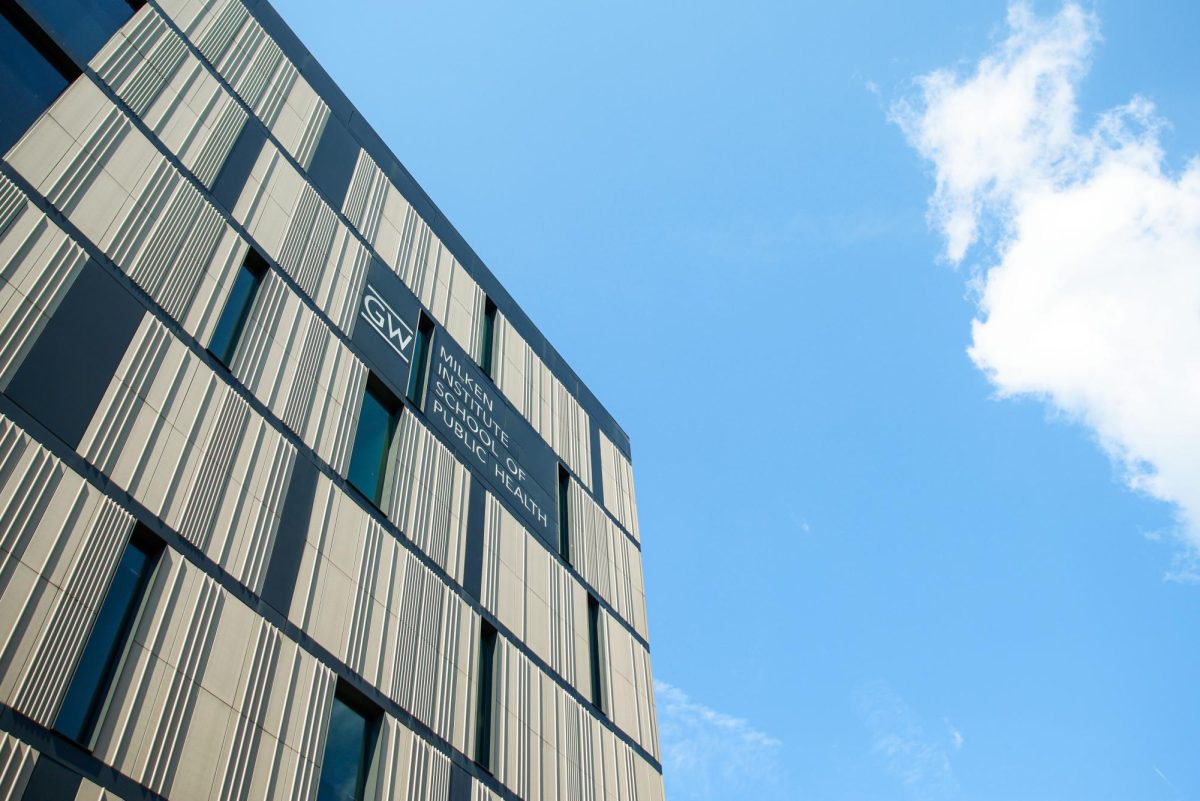A professor from the School of Medicine and Health Sciences was appointed last week to spearhead the Medical Faculty Associates’ COVID-19 response.
Hana Akselrod, the MFA’s first COVID-19 response lead, said her responsibilities include working with clinical leaders to update safety protocols and medical guidelines within the MFA as the coronavirus mutates. She said she will focus mainly on keeping patients safe, but she will also coordinate with Ray Lucas, the medical director of the medical school’s Occupational Health Program, who is in charge of the University-wide response to the pandemic.
“My goal is to make sure we have appropriate testing, treatment and workflow adjustments to continue to provide appropriate and high quality medical care for our patients but with appropriate safety measures, and when needed, treatments for Delta,” she said.
Akselrod said one of her visions is to ensure MFA physicians and staff have resources to improve their wellness and the ability to carry out operations safely despite pandemic burnout. She said she will work “very closely” with Lorenzo Norris, the medical director of psychiatric and behavioral services at the GW Hospital, to improve mental health among MFA employees.
She said the MFA’s COVID-19 response team of physicians and specialists is working with medical departments like the microbiology lab for on-site COVID-19 testing of the GW community. She said she will work with the Milken Institute School of Public Health for guidance on pandemic studies when it comes to using resources and creating a “cohesive” strategy between the MFA and the GW Hospital for handling the coronavirus.
Akselrod has contributed to the University’s COVID-19 efforts since October as the co-director of the MFA’s COVID-19 Recovery Clinic, which treats patients with severe long-term symptoms of the virus. She said she will continue to co-direct the recovery clinic but will not contribute as much as she did prior to her new role as COVID-19 lead.
She said her previous experience at the recovery clinic taught her how to direct a health center, take on operational and practical roles and accommodate patients. She said she aims to build relationships with the different medical specialists in the MFA that will make it a more resilient institution in the face of future variants of COVID-19 or infectious disease challenges.
She said the pandemic has had the largest effect on minority communities who work essential jobs in crowded environments, like cashiers in retail stores, where the virus can spread easily and workers don’t receive paid time off.
“As someone that’s in an institutional leadership role, we need to think about what opportunities can we find, what is within our control to help offset the disproportionate impact of this pandemic on the communities that have borne the greatest pool,” Akselrod said.
Akselrod said it’s crucial for the University, the GW Hospital and the MFA to use a set of policies and structures for patients and students that are consistent with new variants of the coronavirus that may arise.
“The hope is that the work we do now will have longer term implications for a healthier medical system at GW overall,” she said.
The MFA released a set of protocols in light of reopening during the pandemic, which include rules like mandatory masks for staff, patients and visitors, as well as social distancing measures in waiting rooms.
Dahlene Fusco, an assistant professor of medicine and an infectious disease specialist at the Tulane University School of Medicine, said Akselrod’s new role is meant to consolidate decisions about COVID-19 guidelines and clinical trial research into a single position to lead GW’s medical institution. She said the position also needs support from a team that carries out responsibilities like organizing safety guidelines and the influx of information about COVID-19 testing protocols that has been spreading throughout the country.
Bruno Petinaux, the chief medical officer for the GW Hospital, will serve as a source of support for Akselrod, assisting with organizing isolation guidelines, mental health support for employees in the MFA and the University’s contact tracing plans.
Fusco said the Centers for Disease Control and Prevention’s COVID-19 guidelines are helpful for infection control in health care settings, but institutions should monitor the pandemic in their regions while updating protocols. She said her team of nearly 700 COVID-19 researchers at Tulane broke from the CDC when the agency supported unmasking in New Orleans even though less than 30 percent of the population was vaccinated.
“We decided not to unmask because it didn’t make sense for our specific situation,” she said.
She added that investing and training a team of medical faculty like infectious disease specialists is a “huge” challenge considering that infectious diseases is the least funded subspeciality.
“It’s a really tough environment where we’re not investing in training or maintaining people in this field,” Fusco said. “So if this lead you have works on maintaining an interpandemic skilled virology workforce, that makes us all the more ready for the next pandemic.”
Paul Beninger, an associate professor of public health and community medicine at Tufts University School of Medicine, said a COVID-19 response lead is critical in a time with so much misinformation about the pandemic. He said the lead can take a stance against the misinformation and create a bibliography, a combination of sources that those working below the lead can rely on and trust.
He said having a leader also creates opportunities for transparency and invites input from medical researchers and scientists who are involved in executing protocols.
“I think this is an opportunity to really put together a process that involves all of the community that isn’t involved that addresses the concerns as they arise and can be a source of reliable information,” he said.
Beninger said Akselrod will need to set priorities on what databases and studies she can use to support specific protocols with available resources, which will require a higher level of collaboration and coordination within the MFA.
“There’s a huge potential here for all kinds of databases, all kinds of studies, and I think you have to set some priorities and match that up with the available resources that you all have,” he said.








